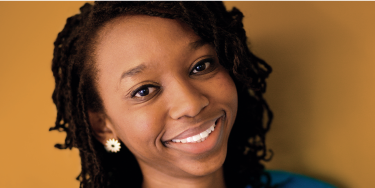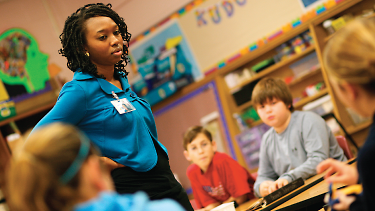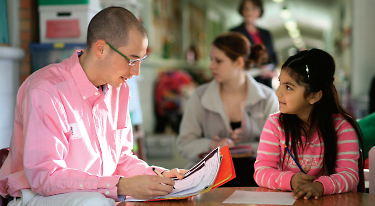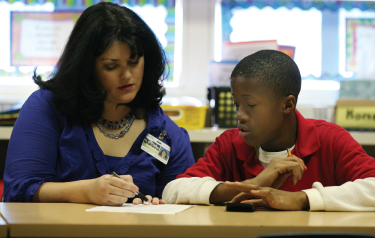Teaching Excellence
Training the teachers of tomorrow has been part of Baylor University's foundation since its earliest days, and with a growing shortage of teachers both in Texas and across the nation, that mission is as important as ever.
"It's in Baylor's motto--Pro Ecclesia, Pro Texana," notes Dr. Jon Engelhardt, dean of Baylor's School of Education. "Whatever is good for the state and good for the church, and preparing teachers is good for both. Education isn't just an extension of who we are; it is who we are."
"It was actually when I was at Baylor that it came to me that I wanted to be a teacher and a coach and have an influence on kids," says Dr. Herb Cox, BS '79, EDD '08, a teacher for 12 years and now principal at McGregor [Texas] High School. Since first graduating from Baylor 30 years ago, Cox has done a little bit of everything, whether that's working with children suffering from autism, mentoring students or developing an education program endorsed by NASA for juniors and seniors in his school district.
Cox's story is not unique at Baylor, where students today continue to find--and begin to fulfill--their calling as teachers in Baylor's School of Education.
The key: four years in real classrooms
Just as education is at the core of Baylor's mission, practical experience is at the center of the School of Education's approach to training teachers. Rather than waiting until their junior or senior years to get into the classroom, Baylor students begin working in local schools as freshmen, tutoring students in several Waco elementary schools.
Tracy Baker, a senior from San Antonio, says she and her classmates have spent time in actual elementary school classrooms during each of their four years at Baylor, learning first-hand what it means to be a professional educator.
"It was scary at first, coming right out of high school and going into an elementary classroom," Baker says. "But it was worth it. I knew right away that I'd made the right decision."
That affirmation, or the hard decision to choose another major, is another reason the School of Education believes it is so important for their students to have field experience almost immediately.
"Of course they have prep work that gets them ready to be in the field in each of those first two years, but they are there working with children and observing in classrooms," says Engelhardt. "By the time they go into the schools full time in their senior year, they certainly know whether or not this is for them."
First two years: one-on-one with students
During their freshman, or novice, year, all education students do field work in elementary schools a few hours each week. They act mainly as tutors in literacy for individual students.
"It's a great opportunity for them to be able to work one-on-one with students, and learn how to teach one of the most fundamental skills: literacy. Reading is so important, no matter what specialty you are looking at," says Dr. Doug Rogers, BS '78, associate dean of the School of Education. "In the freshman experience, they learn to assess, instruct and evaluate. And they find out that if they can do that for one student, they can then move to a small group and finally a whole class."
During their sophomore year, Baylor students move to the grade level or specialty of their choice for field work. They work with students, still on an individual or small-group basis, in a classroom within their area of interest.
"By their sophomore years, we really see the beginning of their maturity and development as educators," says Engelhardt.
Year three: learning to handle a classroom
As juniors, Baylor students begin serving as teaching associates (T.A.s) in schools throughout Waco and the surrounding areas. They are at their assigned schools every day, splitting their time evenly between the classroom and other coursework, such as preparing for certification exams and working on electronic portfolios.
The time spent in local schools at this point is in small-group settings. During Baker's junior year, she spent the first semester working with gifted and talented fourth graders and the second semester with a group of kindergarteners at Hillcrest Professional Development School in Waco.
"That was when I felt more like a grown up, like a teacher," says Baker. "We didn't have the entire class, but we did have to think of our own strategies and figure out how to implement them. We got a lot of guidance from our mentor teachers."
The year spent as T.A.s, says Rogers, is the year technology starts becoming very important. Audio, video and electronic evaluations give students an opportunity to assess both their strengths and weaknesses. Many of these images are included in each student's electronic portfolio, which they work on during their time in the schools. They also learn to use technology to enhance their lesson plans.
"What we find is that they come to us as very good consumers of technology," says Rogers. "We try to make them producers. We expect them to use technology to create instructional tools."
Kimberly Hightower, a 1999 Baylor graduate in special education (who later received her Masters in Curriculum and Instruction from Baylor in 2008), remembers the great amount of electronic recording used during her field work as a student.
"Because of being able to watch myself teaching on videotape, I learned so much," she says. "Sometimes you don't realize how you say things or what your mannerisms are. So while it was awkward at first to watch yourself, it's so worth it. Because of that, I have no problem with someone walking into my room to observe me teach. I credit that to Baylor and the fact that my professors wanted me to be an excellent teacher and used every tool they had to make sure I was."
Hightower, now a middle school special education teacher at Waco's Carver Academy, was recognized as the district's Outstanding Secondary Teacher in 2005 and was named one of Baylor's Outstanding Young Alumni in 2008.
During the summer following the junior year, some students participate in a study abroad program that allows them to spend three weeks student-teaching in a classroom in Costa Rica, London, or Brisbane, Australia, under the supervision of a local teacher. (The School of Education is currently evaluating other study abroad opportunities for its students, including the possibility of traveling to South Central Asia, Thailand and Honduras.)
Students who participate in one of these programs reap tremendous benefits as they gain additional experience in the classroom while also learning firsthand how educational systems in other countries approach education in general and specific problems that arise in the schools.
Year four: what sets Baylor apart
The capstone of Baylor's undergraduate teacher education program is the senior year, when students become teacher interns (student teachers). It's the fourth-year experience that most sets Baylor's program apart from others.
Unlike many other programs, Baylor interns spend their entire senior year in a classroom, far exceeding the 10-week requirement of the State of Texas. Many other programs offer one 15-week semester, with a few weeks of observation and 10 weeks of teaching, but Baylor students, in most cases, graduate with two 15-week semesters of full-time teaching. This provides a wealth of additional experience and gives them a distinct advantage when competing for first-year teaching positions.
During the fall of her senior year, Baker began interning in the Connally (Texas) Independent School District in a fourth grade gifted and talented/accelerated classroom.
"I feel like a faculty member because that's how they treat me," she says. "I feel like I can manage behavior in a classroom because I've been alone in a classroom. I can do my own thing and keep going, and I feel like I'm ready."
Baker also says that in addition to the amount of time she's spent in field work, she feels very prepared by the diverse environments where she's done the work. In her time at Baylor she's worked in a variety of urban and suburban settings, with populations of diverse socioeconomic backgrounds.
"I feel like Baylor really prepares us as teachers. I feel completely prepared. No surprises," she says. "By the time we graduate, we have so much experience in so many backgrounds. Our mentor teachers and the Baylor faculty give us so much."
Report card: praise from the field
"Baylor interns see it all," says Bianca Ochoa, MS '03, a third grade teacher at Hillcrest Professional Development School in Waco. "A very important part of the Baylor program is that interns (seniors) are here from before Day One. They get to see everything that happens before the students get here on the first day. They come in before the school year starts to get the room ready, to see that just doesn't magically happen.
"That [first] day sets the tone for the entire year, and they really need to be there to do that or they aren't getting the full experience," she says. "They get in on the very first assessments where we discover our students' strengths and what they need to work on. They not only get to guide them through the instruction, but then they come back in the second semester and see their progress."
Hightower agrees. "Our interns are involved in every component, every aspect of the job," she says. "They are at every parent conference, they have lunchroom duty, after-school duty; they attend department meetings. That just would not be possible if they were only here for part of one semester."
"They learn to communicate and collaborate," Ochoa adds. "My interns will talk with the counselor or the special ed teacher. They talk with parents. They learn what it's like to work with others to benefit the students they are teaching. By the time they finish their year here, they've worked through problems; they know who to talk to and what questions to ask. They've become real professionals."
The professionalism of Baylor graduates has not gone unnoticed in the teaching community.
Dr. Jeff Turner, BS '77, EDD '95, superintendent of Coppell (Texas) Independent School District, says being a graduate of Baylor's School of Education sets job applicants apart.
"Coppell is one of the finest school districts in the state of Texas, by any measure," says Turner. "We receive hundreds of applications for every job opening we have, and so we are able to select the very finest staff in every situation. Our principals are the ones who do our hiring, and we are so impressed with the quality of teachers we see coming from Baylor, that every time they get a chance to grab a Baylor graduate, they grab one. When we're screening those hundreds of applications, when we see a Baylor graduate, they automatically get a second look."
Sharron Zachry, MS '91, a long-time administrator in suburban Waco's Midway Independent School District, says she also gives Baylor graduates a second look when hiring.
"I'm a strong believer in recruiting those Baylor interns," she says. "Teaching is very demanding and we think Baylor gives their students a leg up. There are skills that you may not even know you need until you get into the classroom. That's why I was excited to see Baylor's program evolve into one that gets their students into a professional setting so much sooner than many schools. They are able to build upon what they learn, year after year."
Giving back: a win-win situation
Baylor students, however, aren't the only ones who benefit from their work in local schools. Ochoa notes that the students in Waco schools and even the full-time teachers benefit from being around Baylor interns.
"When you walk into our school and look down the hallway, you'll see T.A.s working with kindergarteners doing second-grade work; you'll see first-year novices tutoring a child in reading; you'll see our students getting one-on-one attention," she says. "The main benefit is for our students who are getting a great educational experience.
"[But] it never fails; I always end up learning from them, too," Ochoa continues. "It helps my teaching tremendously, not just because they are bringing a new method or new idea, but because I'm having to really reflect on my own teaching. It helps me to focus on why I'm doing the things I do, and how what I'm doing is best for each child. We all win in this kind of environment."
The future of both the School of Education and the teaching profession are certainly bright. Perhaps Clancy Morrical, a senior from The Woodlands, Texas, sums it up best:
"Without a doubt, I feel like I am getting the best education that a future teacher could ask for."



